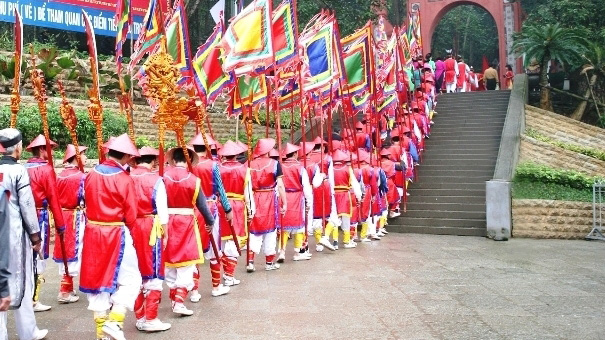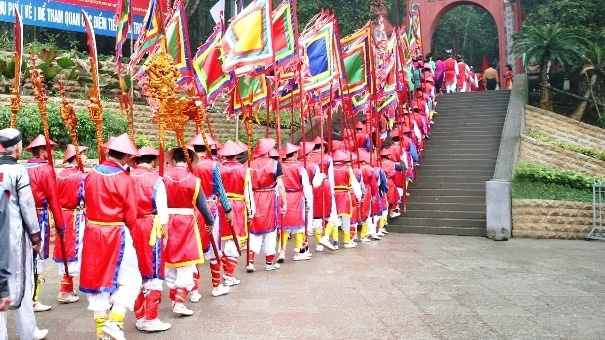
A progrmme commemorating the anniversary of Hung Kings passing, the national ancestors, and Hung Kings Temple Festival will be held from March 24 to April 2 at a national level.
The 2020 Hung Kings Temple Festival will be held from March 24 to April 2. |
The events will take place at the Hung Kings Temple historical relic site in Viet Tri City, Phu Tho Province and surrounding localities.
A range of ceremonies are scheduled for the events, including rituals commemorating the anniversary of the nation’s Great Father Lac Long Quan passing and paying tribute to the nations Great Mother Au Co; localities’ will also offer incense to Hung Kings, and a palanquin procession, among others.
There will also be various cultural, sports and tourism activities such as an art programme to open the Hung Kings Temple Festival; exhibitions; cultural camps; bronze drum beating; dragon dancing; art performances by art troupes from the provinces participating the Festival; performances of Xoan singing (a community performance art from northern Vietnam); puppetry shows at Van Lang park lake and Hung Kings Temple.
In addition, the traditional tennis tournament – Hung Kings cup, the introduction of global martial arts, and a fair for agricultural products with traditional culinary culture are expected to attract numerous visitors.
The annual events aim to honour the nation’s cultural values as well as pay tribute to the great contributions by Hung Kings and the ancestors who dedicated themselves to national construction and defence.
The programme will contribute to consolidating and promoting the national unity bloc.
Source: NDO
With an increasingly vibrant and widespread emulation movement aimed at building cultured residential areas and cultured families, Yen Thuy District has been making steady progress toward improving both the material and spiritual well-being of its people, while fostering a civilized, prosperous, beautiful, and progressive community.
Once lacking recreational spaces and community facilities, Residential Group 2 in Quynh Lam Ward (Hoa Binh City) has recently received attention for the construction of a new, spacious, and fully equipped cultural house. The project followed the model of state support combined with public contributions in both labor and funding.
The "All people unite to build cultural life" movement, which has been effectively integrated with Kim Boi district’s socio-economic development goals, is fostering a lively spirit of emulation across local residential areas, hamlets, villages, public agencies, and enterprises. In addition, through the initiative, traditional cultural values are being preserved and promoted, while community solidarity and mutual support in poverty reduction and economic development are being strengthened.
A working delegation of the Hoa Binh provincial People’s Committee led by its Permanent Vice Chairman Nguyen Van Toan on June 11 inspected the progress of a project to build the Mo Muong Cultural Heritage Conservation Space linked to tourism services in Hop Phong commune, Cao Phong district.
Born and growing in the heroic land of Muong Dong, Dinh Thi Kieu Dung, a resident in Bo town of Kim Boi district, in her childhood was nurtured by the sweet lullabies of her grandmother and mother. These melodies deeply imprinted on her soul, becoming an inseparable part of her love for her ethnic group's culture. For over 20 years, this love for her hometown has driven Dung to research, collect, and pass down the cultural values of the Muong people to future generations.
In the final days of May, the Ethnic Art Troupe of Hoa Binh Province organized performances to serve the people in remote, mountainous, and particularly disadvantaged areas within the province. These were not just ordinary artistic shows, but they were the meaningful journeys aimed at spreading cultural values, enhancing the spiritual life of the people and contributing to the preservation of ethnic minority cultural identities.



